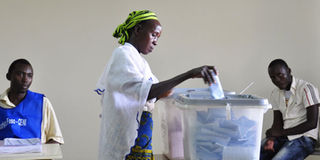Burkina Faso votes in test for Compaore regime

PHOTO | AHMED OUOBA A woman casts her ballot in a polling station in Ouagadougou during legislative and municipal elections, on December 2, 2012.
What you need to know:
- Sunday's elections are the first since a deep crisis erupted in early 2011, when a wave of mutinies and violent popular protests almost toppled the administration of Compaore, who has been in power since a 1987 military coup
- A new biometric voter registration system was introduced after the opposition claimed voter fraud in past elections, including the 2010 presidential vote
- The vote also comes as Burkina Faso is tied up in regional conflict, with Compaore acting as chief mediator of the crisis in Islamist-controlled northern Mali.
OUAGADOUGOU
Voters in Burkina Faso went to the polls on Sunday in legislative and municipal elections seen as a test for the regime of President Blaise Compaore which was almost toppled in a wave of violence 18 months ago.
Faced with a still divided opposition in one of the world's poorest countries, Compaore's powerful Congress for Democracy and Progress (CDP) party remains the big favourite despite internal tensions.
Sunday's elections are the first since a deep crisis erupted in early 2011, when a wave of mutinies and violent popular protests almost toppled the administration of Compaore, who has been in power since a 1987 military coup.
Some 4.3 million people are eligible to vote in the landlocked west African nation in the last polls before Compaore's final term is set to expire in 2015.
Sunday's polls are "important for the promotion of democracy," the 61-year-old Compaore told reporters. "There is no reason why there wouldn't be a calm and peaceful election."
Voting was largely peaceful, although a handful of incidents were reported, including the theft or burning of ballot boxes in some villages, and a lack of voting papers and security agents in other areas.
A new biometric voter registration system was introduced after the opposition claimed voter fraud in past elections, including the 2010 presidential vote.
Recalling the 2011 unrest, voter Amina Derme, 53, told AFP: "It probably set the country back one or two years. That's why I want this election to take place peacefully."
Mohamed Zongo, a 27-year-old driver, said he was voting for change. "It's been years that it's always the same people... There's too much injustice in this country."
Nearly half the population of 16 million lives under the poverty threshold.
The vote also comes as Burkina Faso is tied up in regional conflict, with Compaore acting as chief mediator of the crisis in Islamist-controlled northern Mali.
Some of his supporters have pressed for a new constitutional amendment to allow him to seek a new mandate, but he may instead prefer to pass the baton to his younger brother Francois, who has advised him for the past 24 years.
Blaise Compaore was first elected to a seven-year term in 1991 in an election boycotted by the main opposition parties, and he won re-election in 1998.
He ran again in 2005 and 2010 despite a constitutional amendment limiting the presidency to two terms and reducing their duration to five years. The constitutional council ruled that the amendment did not apply to Compaore because he was a sitting president when it was passed in 2000.
Francois Compaore is considered the new CDP strongman, and several party elders were abruptly let go in the name of "renewal" to bring in youths and women.
What many have seen as a purge has caused deep tensions within the party, even though little is mentioned publicly.
The CDP has 73 seats in the 111-member National Assembly and can count on support from 26 allied lawmakers. The body is adding 16 seats in this election.
Results are expected by Thursday.




